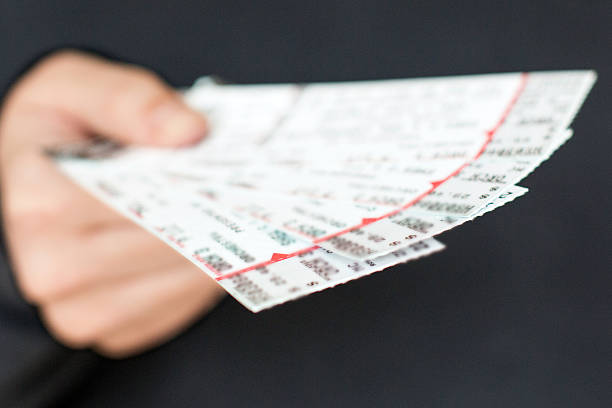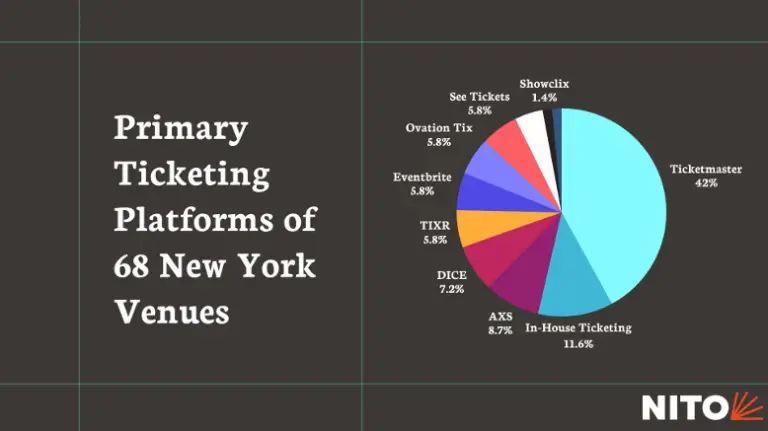If you’re a frequent concertgoer in New York State, you’ve likely noticed the skyrocketing costs of ticket fees in the past several years. The National Independent Talent Organization (NITO) has just put numbers to this ongoing problem in their newest study, which confirms the average primary ticket fees in NY have risen to 28.65%, an increase of over 36% in under a decade.

NITO’s study has found that if you were to pay for the average concert ticket these days – $69.70 at face value – you would be spending about $17.51 additionally in fees. To make matters worse, when tickets were priced at $40 or less, their averages surged to a resounding 35.5%.
Concert tickets nowadays have become increasingly unaffordable, especially for artists with any sort of name recognition. In the resale market, ticket prices are often inflated to hundreds or even thousands of dollars above face value. Whether fans want to see more established artists or lesser-known acts for a lower cost, they are bound to get burdened by these unreasonable fees. By choosing a concert at a lower price point, they are evidently being penalized with even higher secondary costs.
Artists cannot control ticket fees and do not profit from them – these thousands of dollars all funnel into the hands of the corporations hosting ticket sales, like Ticketmaster, TicketWeb, or AXS. Ticketmaster and AXS fees nearly doubled that of all the other services, averaging 34.73%, whereas the other providers averaged 18.71%. In fact, every instance of a ticket fee exceeding 40% of the ticket’s face value took place either on Ticketmaster, TicketWeb, or AXS. Some cases even showed fees costing over 100% of the ticket’s face value.

These exploitative fees aren’t limited to the primary sellers, either. On resale platforms, like SeatGeek, StubHub, and Vivid Seats, fees were even higher, averaging at 38.95%, or 10% over the primary market average. As it stands, New York State law permits a “reasonable” fee being charged alongside the more necessary delivery fees. However, nowhere is there any stipulation on what constitutes “reasonable.” NY law does, however, prohibit “service charges in excess of the actual cost” of delivering a ticket, though that seemingly has not stopped many companies.
This lack of jurisdiction has led to some outstanding cases of fee exploitation. It’s not only the major venues taking advantage of concertgoers, either: NITO discovered that 2 shows hosted at local amphitheaters collected more than $200,000 in primary market ticket fees.
The ticketing fee crisis in New York is just one piece of the current issue of systemic distortion of value in the US. The value of live entertainment has been grossly inflated, and as many fans remain unaware that artists have no control over these decisions, trust between artists and audiences has eroded.
“The system we have in place is not sustainable. When the artist sets a $30 ticket price, but it costs the fan $50 to get through the door, something isn’t working. With this NITO report, we want to expose the true cost of these fees and bring everyone together to find a solution that works for artists and fans.”
-Nathaniel Marro, NITO Executive Director
NITO conducted this study to help publicize this escalating ticket fee crisis and to offer a call to action. NITO encourages all stakeholders in this issue – that is, artists, agents, venues, promoters, and the ticketing platforms themselves – to foster an open dialogue working toward a solution. Not all additional fees are meant to exploit customers: for many, these fees were necessary to support the high costs of producing live entertainment. These fees are often higher for the smaller and more independent venues and promoters because they lack the variety of revenue streams that major corporations and venues have.
NYS legislation is a possibility (NITO suggests they cap ticket fees at 15%), but real change requires much more than legislation. All of the key players in the industry, including artists, venues, the ticketing corporations, and everyone in between, need to join forces to construct a better system.
At this new system’s core should be key values of transparency, fairness, sustainability, and cooperation. Only under these circumstances can fans truly be protected, live events be fully enjoyed, and the ticketing process be entirely trusted again. Change may take time, but it will be worth it to ensure the live entertainment industry acts for the benefit of everyone, not just its biggest players.
To read the full report from NITO, click here.


Comments are closed.